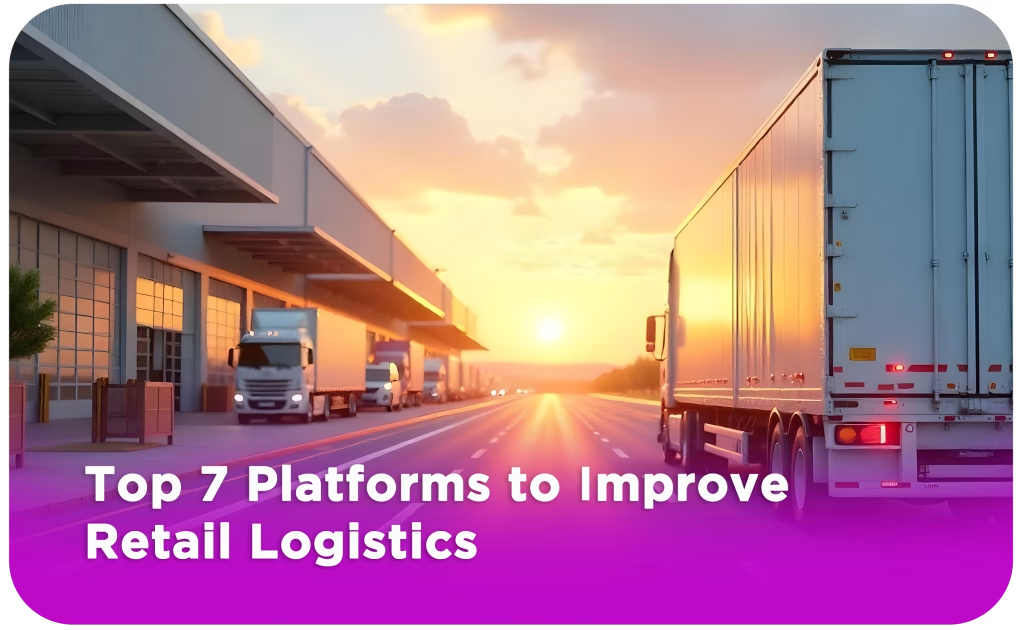Top 7 Platforms to Improve Retail Logistics
Retail logistics in 2025 is less about managing warehouses and more about managing complexity.
Between online orders, in-store pickups, returns, and real-time inventory updates, retailers need software that moves as fast as their customers.
Delays in routing, stock-outs, and mismatched demand often lead to missed sales opportunities. Retail logistics software plays a direct role in shaping the customer experience and meeting delivery expectations.
The rise of AI-driven tools has shifted how retailers plan routes, forecast demand, and manage inventory across channels. But with so many solutions available, choosing the right software can be overwhelming.
This guide lists down the 7 best retail logistics software options in 2025 based on their ability to help you optimize inventory management, streamline delivery route planning, and support a truly omnichannel retail experience.
1. Mile – The All-Rounder for Retail Logistics in Emerging Markets
Mile is quickly becoming the go-to logistics platform for businesses operating in the Middle East, Africa, and South Asia. It’s designed for retailers and eCommerce platforms that need to juggle multiple delivery partners, regional fleets, and fragmented supply chains.
Mile’s strength comes from its modular platform that facilitates last-mile delivery, middle-mile tracking, rider assignment, and even warehousing.
But what truly sets Mile apart is its AI demand forecasting engine. It helps businesses predict product movement across regions based on local behavior and historical data. For retail chains that want more control over demand spikes and sales cycles, this tool is a game-changer.
Mile also supports delivery route planning with multi-stop route planning capabilities, which is critical for companies managing high delivery volumes in congested urban areas. Its Shopify plugin brings another layer of convenience by connecting store orders directly to Mile’s network of vetted delivery partners.
2. Tookan – Flexible Task Management for Retail Deliveries
Tookan, by JungleWorks, offers a solid delivery management solution for businesses that need control over their field workforce. It’s especially helpful for retail stores that still rely on their own delivery fleets rather than third-party couriers. Tookan is built around a task-based workflow: you can create, assign, and track delivery tasks from a single dashboard.
The platform integrates with POS systems and CRMs, making it easier for brick-and-mortar retailers to stay aligned with online orders. You can plan optimized delivery routes, assign them to specific drivers, and get real-time updates. Tookan doesn’t go deep into ai demand forecasting, but it covers the essentials for businesses that need day-to-day control over operations.
Its flexibility allows small retailers to scale quickly, adapting task flow to the season or campaign without changing platforms.
3. Route4Me – Smart Route Optimization for Retail Teams
If delivery route planning is your biggest challenge, Route4Me is worth a look. It’s laser-focused on optimizing routes and making field logistics simpler for companies of all sizes. Retailers that run in-house delivery or service fleets will appreciate Route4Me’s drag-and-drop interface and real-time route monitoring.
The software stands out for its multi stop route planning. Whether your business handles scheduled deliveries, mobile showrooms, or store-to-store transfers, Route4Me can help cut down fuel costs and delivery time.
Although it currently doesn’t offer built-in inventory tools, Route4Me integrates well with third-party systems. This makes it a good fit for retail teams looking to plug route intelligence into an existing logistics tech stack.
4. LogiNext – Enterprise-Grade Visibility and Automation
LogiNext serves large-scale retailers, courier companies, and logistics service providers who need detailed control over everything from hub operations to last-mile tracking. It’s a powerful platform that combines route optimization, field workforce automation, and end-to-end visibility.
Retailers with hundreds of SKUs across multiple warehouses will find LogiNext’s data-driven approach useful. It helps predict product flow and schedule deliveries using AI-backed models. This feature can be quite instrumental in both retail demand forecasting and omnichannel inventory optimization.
With advanced modules for delivery routing and geofencing, LogiNext gives operations managers real-time updates about order movement and potential delays. While the interface can be dense for smaller teams, the platform’s configurability makes it suitable for enterprise logistics.
5. Onfleet – Clean, Modern Logistics for Retail Delivery
Onfleet is best known for its simple interface and clean user experience. It’s built for businesses that want logistics software without the clutter. Onfleet handles everything from driver assignment to proof-of-delivery and offers mobile apps for drivers and dashboards for managers.
Retailers running scheduled or on-demand deliveries such as same-day groceries or fashion drop-offs often prefer Onfleet for its route planning capabilities. It allows users to drag and drop deliveries into the most time-efficient paths.
Currently, Onfleet doesn’t include warehouse or inventory modules, but it integrates well with tools that do and fits neatly into broader logistics stacks. Paired with a good warehouse management software or ERP, Onfleet becomes a smooth delivery layer with accurate driver ETAs and seamless notifications.
6. Shipox – Delivery Management for eCommerce Retail
Shipox is built with regional eCommerce businesses in mind. Based in the UAE, Shipox works well for retailers in the Middle East who need to manage multiple delivery partners and growing online order volumes. It offers shipment management, driver tracking, and delivery performance analytics, all under one roof.
Where Shipox shines is in managing outsourced logistics workflows. Retailers that rely on multiple third-party delivery providers can bring all carriers onto one platform, track order statuses, and reduce delays from poor communication.
Its delivery route planning tools allow dispatchers to assign multiple stops and optimize trips within city zones. The software also integrates with Shopify and WooCommerce, which helps with automatic order syncing and fulfillment.
7. Omniful – Omnichannel-Ready Platform for Inventory and Fulfillment
Omniful is designed for the modern retailer who sells through marketplaces, physical stores, and direct websites. The platform combines warehousing, order management, and fulfillment workflows into one cloud-based tool. If your retail business has inventory stored across multiple locations, Omniful centralizes on a single-view dashboard.
A major benefit of using Omniful is its built-in support for omnichannel inventory optimization.It gives you real-time inventory status across all touchpoints, thereby helping reduce stock-outs and overstock scenarios. When paired with retail demand forecasting models, it allows retailers to shift inventory closer to the customer.
Omniful also supports smart order routing. It automatically assigns orders to the most logical fulfillment node based on inventory availability and delivery distance. This saves time and keeps delivery costs lower, particularly for regional or international brands.
Choosing the Right Software for Your Retail Business
Each of these platforms serves a different type of retail operation. The right choice depends on whether your team needs help with route optimization, demand prediction, inventory syncing, or delivery partner coordination.
- If you’re a growing eCommerce player in need of AI-powered analytics and regional delivery partnerships, Mile offers a strong balance of features.
- For retailers focused on managing local delivery teams, Tookan and Onfleet are worth exploring.
- If you’re expanding into multi-city or multi-warehouse operations, Omniful and LogiNext lend more control and scalability.
You don’t need a single system that does everything; you need one that does the right things for your business model.
Want to Try Mile?
Mile is built for fast-scaling retail businesses that want better visibility, smarter delivery routing, and actionable demand data. From AI demand forecasting to multi-stop route planning and omnichannel inventory optimization, Mile equips your retail ops team to stay ahead.
Ready to see how Mile fits your business? Schedule a demo with Mile and take a closer look at how it can support your retail logistics strategy in 2025.


